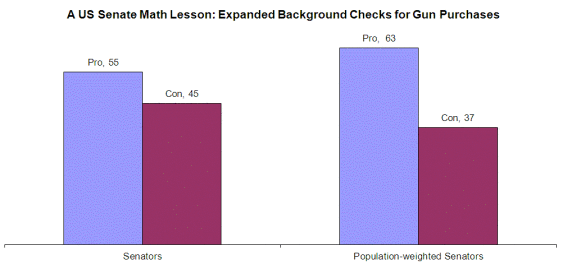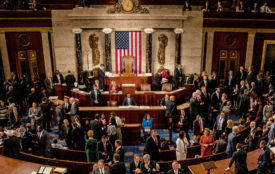Yesterday, the US Senate failed to break a filibuster against expanding background checks for buyers of guns.
Under the undemocratic and historically accidental rules of the Senate, it takes 60 votes to end debate. The majority mustered 55.
Whatever you believe about this particular legislation, supermajority rules are no way to govern a sophisticated, diverse, industrial democracy in a fast-changing global economy, especially when the supermajority requirement is piled on top of a representation system that absurdly exaggerates the influence of small-population states. The 55 Senators who wanted to break the filibuster represented not 55 percent of the electorate but 63 percent. Senators voting to sustain the filibuster represented just 37 percent. If Senators’ votes were weighted to reflect how many voters they spoke for, the majority would have broken the filibuster.
In any other industrial democracy, representatives of 63 percent of the electorate could easily implement their legislative agenda. Time to fix the Senate.
Methods and sources same as here. Senate vote tally here. Senate Majority Leader wanted to break the filibuster but switched his vote to “no” in order to comply with Senate rules that would thereby open him a parliamentary path to reconsidering the issue. I therefore tallied him as a “yes.” [UPDATE 4/18/13: A spreadsheet error led to me initially publishing this post with the population-weighted votes as 60-40, rather than 63-37.]









Dave
Alan,
While I agree with the farce surrounding this vote (85% of the surveyed public wanted this simple backgroudn check measure), I disagree with your logic of the “representation system that absurdly exaggerates the influence of small-population states.” You are forgetting the basic principles of how the U.S. Congress was established. Remember your high-school lesson of “The Great Compromise?” After extensive debate, the framers of the Constitution agreed to create the House with representation based on population and the Senate with equal representation. This was proposed by Ben Franklin. Without it, there would likely have been no Constitution. That being said, most current-day bills originate in the House (where representation is at least based on population), and if passed, move to the Senate, then differences are worked out in committee. With our present-day House so broken, nothing can move, thus you are seeing more bill originate in the Senate – although in this case, broken as well.
Ron Toppi
The biggest myth about this country is that it is a Democracy. The united States of America is not and never has been a Democracy, it is a Representative Republic. The difference being that in a true Democracy the people decide policy matters and laws directly. In a Republic the people choose representatives to decide these matters.
What we have today is a system that does not allow the people to choose much of anything because for one; the 2 party system insures continuity and absolutely no room for real debate and different ideas, 2; our so called representatives are heavily influenced by lobbiests for Corporations not the people.
If you want Democracy, make changes in your local government, hold town meetings and get THE PEOPLE INVOLVED. Quit waiting for the Federal government to do anything on your behalf, they wont, they can’t.
GW
The supermajority requirement for the vote on this issue was not categorically required by Senate rules. It was required under the process the bill sponsors chose to use in order to try and ram the bill through without debate or amendments (since they knew that they didn’t have the support to survive a standard debate and amendment procedure). They wanted to get it approved unilaterally with no comment or input from their opposition. THAT requires a supermajority vote under Senate rules. So, if you’re going to blame the process for this failure, you should blame the people who chose to do it in a way that required a supermajority vote when they didn’t have to: Harry Reid and Barack Obama.
Alan Durning
GW,
Under current Senate rules, there is no procedure under which filibustering is banned, with the exception of budget reconciliation. Budget reconciliation is reserved for budget-related bills.
GW
You might find this interesting: Why Reid Needed 60 Votes
“The latter scenario is the path Senate Majority Leader Harry Reid (Nev.) chose to take. He asked for the Senate’s unanimous consent to require 60 votes for each of the nine amendments. Since no senators objected, that’s where the bar is set.”
“So, why didn’t Reid try to get the unanimous consent agreement to set all amendment votes at a 51-vote threshold?
Because to do that would have opened the bill up to the very likely possibility that amendments favored by gun rights advocates would be added to it. One, for example, would allow gun owners who receive a state-issued permit to carry a concealed weapon to take that weapon into other states that issue such permits.”
So, basically, it didn’t have to go the way it went. Reid and the gun control advocates were trying to game the voting rules to ram the thing through without amendments they didn’t like or extensive debate, and it backfired on them.